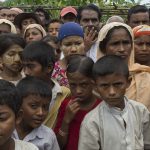The last election in Myanmar (also known as Burma) gave hope to minority groups in the country. After five decades of military rule, the National League for Democracy (NLD), party of Nobel Laureate Aung San Suu Kyi, won a landslide victory in the country’s first truly democratic election since 1990. The election presented an historic opportunity for unity and change.
Unfortunately, positive change has not yet come for the Rohingya minority in the country. Suu Kyi crossed the line of neutrality into a dangerous tone of exclusion earlier this month when she advised the United States to refrain from using the term “Rohingya” because the group is not an officially-recognized minority.
For decades, Myanmar’s Rohingya Muslim minority population has been subjected to such a large number of abuses by the government that the United Nations has deemed them “the most persecuted minority in the world.” Disenfranchised and denied direct representation in Parliament, the Rohingya had been holding out great hope that the NLD could amplify their voice. Yet the NLD has given little indication it is addressing the deteriorating plight of the Rohingya with any urgency. Private diplomacy may be a preferred political approach, but the NLD’s silence is in striking contrast to the outspoken movement that rejects the right of the Rohingya to belong in Myanmar. These anti-Rohingya groups refuse to even acknowledge the term “Rohingya” and instead use “Bengali” – implying that the Rohingya are immigrants from Bangladesh and not a group indigenous to Myanmar. To its credit, the new government appears to have renounced use of the term “Bengali,” while still refusing to use the term “Rohingya.”
U.S. officials should not ignore these developments as they consider shifts in bilateral relations with Myanmar. As we were reminded by Representative Eliot Engel immediately following the election, “Burma’s transition to democracy is not just about what happens on Election Day but about how leaders choose to govern and meet the country’s many challenges regardless of who takes power.”
Many – including Suu Kyi, a known symbol of democracy whom many believe is the only person capable of bringing democracy to Myanmar – cautioned that change will take time. The NLD government was only recently installed, and significant challenges lie ahead. Despite the number of problems facing the new government – civil war, poverty, corruption, dysfunctional bureaucracy – concerns about human rights conditions and violence against ethnic and religious minorities must not be muted. Patience with, and support for, the new government must be delivered with a critical eye, mindful that toxic policies in any sector can quickly metastasize and drive the promise of democracy into collapse.
Neither an historic election nor the NLD can transform Myanmar overnight. Change must ultimately emanate from within communities in cities, towns, rural areas, and ethnic states. But these communities will take their lead from the new government. The NLD needs to show leadership and support the democratic and rights-based values it has represented for decades. If Myanmar has any hope of achieving a real democracy and national reconciliation, it is essential that all groups be recognized and their basic human rights respected.

